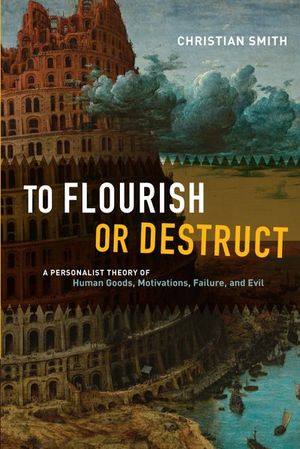To Flourish or Destruct
Published by The University of Chicago Press
A study of what motivates humans and the activity that gives rise to human social life and social structures.
In his 2010 book What Is a Person?, Christian Smith argued that sociology had for too long neglected this fundamental question. Prevailing social theories, he wrote, do not adequately “capture our deep subjective experience as persons, crucial dimensions of the richness of our own lived lives, what thinkers in previous ages might have called our ‘souls’ or ‘hearts.’” Building on Smith’s previous work, To Flourish or Destruct examines the motivations intrinsic to this subjective experience: Why do people do what they do? How can we explain the activity that gives rise to all human social life and social structures?
Smith argues that our actions stem from a motivation to realize what he calls natural human goods: ends that are, by nature, constitutionally good for all human beings. He goes on to explore the ways we can and do fail to realize these ends—a failure that can result in varying gradations of evil. Rooted in critical realism and informed by work in philosophy, psychology, and other fields, Smith’s ambitious book situates the idea of personhood at the center of our attempts to understand how we might shape good human lives and societies.
Praise for To Flourish or Destruct
“This major work in sociology theory should be read by social scientists in all disciplines. Highly recommended.” —Choice
“To Flourish or Destruct poses a powerful and important challenge to the entire discipline of sociology. Smith is becoming the anchor of a humanist renewal in sociology and although he is not alone in this movement, what makes To Flourish or Destruct different is a coherent, new, oppositional perspective that draws on critical realism to affirm both human personhood and the ever-present moral element in human affairs. Smith’s Personalism could become the banner around which a very different kind of sociology develops, one that respects the centered consciousness that is human personhood.” —Douglas Porpora, Drexel University
“This book represents a major advance in sociology and more specifically within critical realism, which is gradually emerging as a full-fledged alternative in the social sciences. I am fundamentally convinced by this book.” —George Steinmetz, University of Michigan
In his 2010 book What Is a Person?, Christian Smith argued that sociology had for too long neglected this fundamental question. Prevailing social theories, he wrote, do not adequately “capture our deep subjective experience as persons, crucial dimensions of the richness of our own lived lives, what thinkers in previous ages might have called our ‘souls’ or ‘hearts.’” Building on Smith’s previous work, To Flourish or Destruct examines the motivations intrinsic to this subjective experience: Why do people do what they do? How can we explain the activity that gives rise to all human social life and social structures?
Smith argues that our actions stem from a motivation to realize what he calls natural human goods: ends that are, by nature, constitutionally good for all human beings. He goes on to explore the ways we can and do fail to realize these ends—a failure that can result in varying gradations of evil. Rooted in critical realism and informed by work in philosophy, psychology, and other fields, Smith’s ambitious book situates the idea of personhood at the center of our attempts to understand how we might shape good human lives and societies.
Praise for To Flourish or Destruct
“This major work in sociology theory should be read by social scientists in all disciplines. Highly recommended.” —Choice
“To Flourish or Destruct poses a powerful and important challenge to the entire discipline of sociology. Smith is becoming the anchor of a humanist renewal in sociology and although he is not alone in this movement, what makes To Flourish or Destruct different is a coherent, new, oppositional perspective that draws on critical realism to affirm both human personhood and the ever-present moral element in human affairs. Smith’s Personalism could become the banner around which a very different kind of sociology develops, one that respects the centered consciousness that is human personhood.” —Douglas Porpora, Drexel University
“This book represents a major advance in sociology and more specifically within critical realism, which is gradually emerging as a full-fledged alternative in the social sciences. I am fundamentally convinced by this book.” —George Steinmetz, University of Michigan
BUY NOW FROM
COMMUNITY REVIEWS

